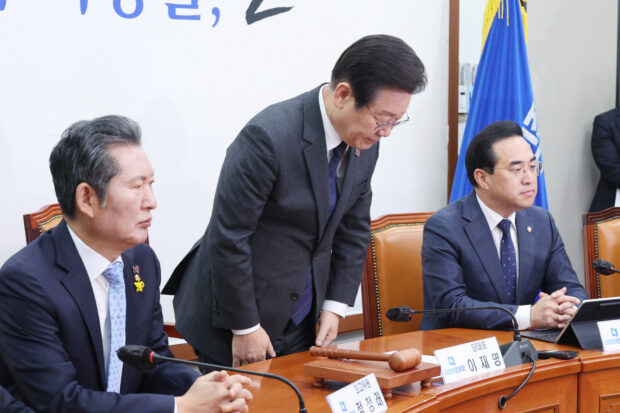
Lee Jae-myung, chairman of the main opposition Democratic Party of Korea, bows at a leadership meeting of the party in Seoul on Monday, April 17, in a show of apology over a campaign fundraising scandal that occured during the 2021 party convention. (Yonhap)
Main opposition party leader Lee Jae-myung on Monday delivered a public apology for concerns over intensifying allegations that illicit, unreported funds were distributed in envelopes containing cash at the party’s convention in 2021.
The Democratic Party of Korea chairman said he has asked his predecessor Song Young-gil, a suspected beneficiary of the alleged illicit campaign financing scheme, to return to South Korea.
“I’m extending my words of apology for causing concern and leaving people disappointed,” Lee said in a leadership meeting.
“I’m asking the investigative authorities to be quick and impartial, free of political considerations. The Democratic Party will bear the responsibility and take corresponding action on verified evidence.”
The apology by the opposition leader came after the party became embroiled in the scandal involving former chairman Song. According to allegations, during his party leadership campaign in May 2021, a combined total of 94 million won ($71,530) of cash contributions were mobilized and funneled to scores of opposition party lawmakers through Song’s aides without proper bookkeeping, according to prosecutors. Song then clinched a narrow victory by 0.59 percentage points.
Korea considers any political fundraising beyond the legal cap or without proper record-keeping through a specific entity authorized by the election authorities as illegal.
Song stepped down in March 2022 immediately after Lee’s narrow loss in the presidential election against the incumbent President Yoon Suk Yeol. Lee succeeded Song’s post in August.
Song has been in Paris, working as a visiting professor at the ESCP Business School, since December after he was defeated by Oh Se-hoon during the Seoul mayoral election in April.
“The truth behind (the election campaign financing in the 2021 party convention) has yet to be fully revealed, but I believe now is the right time to make an official statement,” Lee said.
“The Democratic Party is taking this issue seriously. We will do our best to uncover the truth and settle the controversy. For this, I’ve asked Song to return to Korea promptly.”
Lee switched from his earlier stance that the prosecution’s investigation was politically motivated to persecute its political enemies. Song has reportedly denied the accusations.
Kim Gi-hyeon, who leads the ruling People Power Party, urged Lee to bring Song back to Korea and to let lawmakers allegedly involved in the scandal comply with investigators without exercising their privilege not to be apprehended, in a meeting with the party’s decision-makers on Monday.
The bribery scandal came to the fore last week as the prosecution launched an investigation involving a search and seizure operation into Democratic Party Reps. Youn Kwan-suk and Lee Sung-man.
Youn and Lee were among Song’s key aides during his party election campaign in 2021. They were allegedly involved in distributing illegal cash contributions from Kang Rae-gu, a former head of the Association of Public Institution Auditors to solicit votes for Song. Lee Jung-geun, the former Democratic Party deputy secretary general, is also suspected of brokering “donations” from Kang.
The suspicions stemmed from Lee Jung-geun’s phone logs. Lee was convicted in a separate bribery case last week. The record obtained by prosecutors showed that Kang’s contribution had been funneled into the Democratic Party voters via Lee and Song’s aides.
The prosecutor is likely to probe whether money was given to DP members in exchange for favors or in connection to Song’s convention victory.
Youn and Lee have denied the allegations in separate statements.
Illegal fundraising for election campaigns during a party convention is deemed a criminal act in Korea. Under the Korean law, those who exchange money or favors can be punished with up to three years or imprisonment or a fine of up to 6 million won. Those who brokered the illegal fundraising may face up to five years of imprisonment or up to 10 million won fine.
In a separate case, the ex-deputy secretary general was sentenced to 4 1/2 years behind bars on Wednesday at a district court for pocketing 1 billion won in bribes from a businessperson surnamed Park from 2019 to 2022 in exchange for preferential treatment. The court handed down a heavier punishment than what the prosecution had sought — a three-year imprisonment. Her bail application was also rejected Wednesday.
The Democratic Party holds majority power with 169 seats at the National Assembly. A general election is scheduled to take place in April 2024.
Opposition leader Lee himself is facing multiple charges. Lee, an outspoken detractor of Yoon, has been indicted for being involved in a high-profile land corruption scandal in southern Gyeonggi Province, allegedly making false statements during the presidential election campaign and soliciting third-party bribery. Lee has denied all the allegations.